Ahrefs has long been a dominant player in the Search Engine Optimization (SEO) software market, valued by professionals for its powerful suite of features. However, recent strategic changes, particularly the introduction of a new credit-based pricing model, have prompted many long-term users to seek alternatives.
This shift has illuminated a dynamic and competitive marketplace, now populated by a diverse range of powerful tools catering to various needs and budgets.
The search for an Ahrefs alternative is no longer about finding a lesser substitute, but about identifying a platform that offers the right combination of features, data accuracy, and value for specific business objectives.
This article provides an objective, evidence-based evaluation of the leading Ahrefs alternatives to help marketing professionals, agencies, and business owners select the best Ahrefs alternative for their goals.
It will begin with an analysis of direct all-in-one competitors that aim to match or exceed Ahrefs’ comprehensive functionality. Following this, we will review a selection of specialized niche tools that excel in specific areas of SEO. Finally, it will present a practical framework to guide the decision-making process, ensuring a strategic alignment between software investment and business outcomes.
Market Segmentation: Differentiating the Ahrefs Alternatives
Understanding the strategic segmentation of the SEO tool market is crucial for any evaluation. An “Ahrefs alternative” can signify a complete platform replacement for one user, while for another, it may mean a supplementary tool for a single, specialized function.
The platforms available today can be categorized into two primary segments, each serving a distinct user profile and set of business requirements.
All-in-One SEO & Marketing Suites
These platforms are designed to be direct competitors to Ahrefs, offering a comprehensive and integrated feature set.
They aim to cover the full spectrum of SEO tasks, from keyword research, backlink analysis, and rank tracking to technical site audits and competitor analysis. In many cases, these suites extend beyond core SEO to include functionalities for paid advertising, content marketing, and social media management. Primary examples in this category include Semrush, SE Ranking, and Moz Pro.
Specialized & Niche Tools
This segment consists of platforms that focus on excelling in one or two specific areas of SEO. Rather than attempting to be a comprehensive solution, these tools provide deep functionality in a focused domain, such as backlink monitoring, content optimization, or emerging keyword trend discovery.
They are ideal for professionals who need to supplement their existing toolset with best-in-class capabilities for a specific task or for those whose needs do not warrant the expense of a full all-in-one suite.
Now let’s proceed with a detailed, head-to-head comparison of the leading all-in-one suites that represent the most direct alternatives to Ahrefs.
Comparative Analysis of All-in-One SEO Suites
Let’s compare the most prominent all-in-one platforms positioned as direct competitors to Ahrefs.
Each tool is evaluated based on its distinct market positioning, core features, notable strengths and weaknesses, pricing structure, and ideal user profile, with all analyses drawn directly from the provided source material.
Semrush
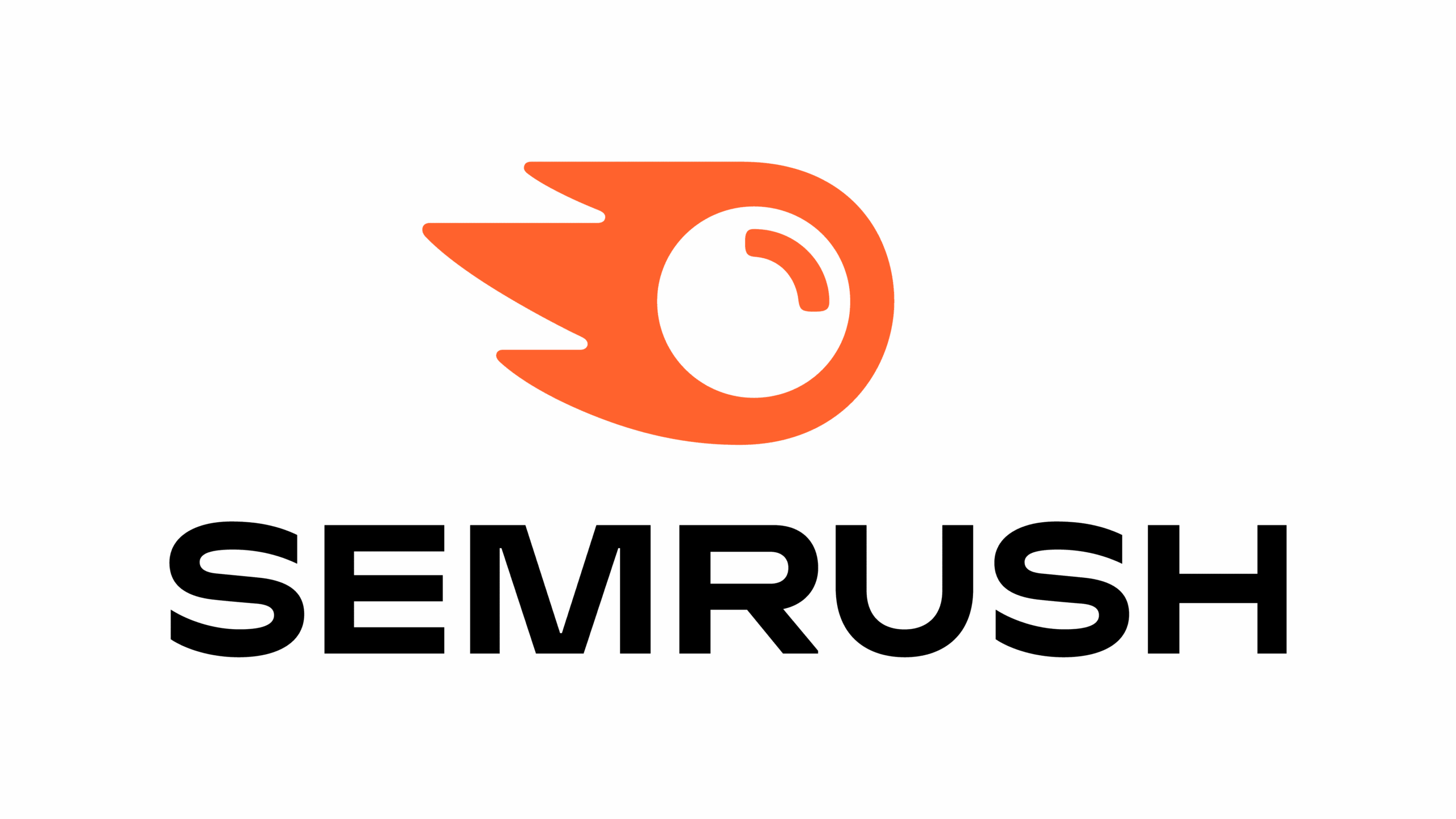
Semrush is positioned as the most direct and powerful competitor to Ahrefs. It is frequently described not merely as an SEO tool but as an expansive “all-in-one digital marketing tool” that integrates SEO with robust features for Pay-Per-Click (PPC), social media management, and content marketing.
This broader scope makes it a central hub for entire marketing teams, rather than just SEO specialists.
Core Strengths
- Extensive Toolkit: The platform boasts over 55 distinct tools, covering a vast range of digital marketing functions from SEO and PPC to content and social media.
- Powerful Keyword Research: The Keyword Magic Tool is highlighted for its ability to generate thousands of keyword ideas, with advanced filters for intent and difficulty. Semrush’s USA keyword database is noted as being larger than Ahrefs’ (3.7 billion vs. 2.4 billion keywords).
- Accurate Traffic Estimates: The platform provides more accurate traffic estimates, an observation supported by Victoria Kurichenko’s direct comparison, which showed Semrush’s estimate (15,100) was closer to Google Search Console data (8,000) than Ahrefs’ highly inflated figure (47,400).
- Intuitive Data Visualizations: The platform is praised for its visual reports that make complex data easier to analyze.
- AI-Powered Insights: Features like the Semrush Copilot AI provide helpful summaries and highlight key traffic changes directly on the dashboard, and the platform can track brand visibility across AI platforms like ChatGPT.
Identified Weaknesses
- Steep Learning Curve: The sheer breadth of features can be overwhelming for beginners, requiring time to navigate and master the platform. However, analysts like Claire Broadley note that recent additions like the Semrush Copilot AI and improved data visualizations are designed to mitigate this complexity by surfacing key insights automatically.
- Data Estimation: Like all third-party tools, its metrics are estimates that can vary from first-party data in Google Analytics or Google Search Console.
Pricing and Trial Model
- Plans start at $139.95 per month for the Pro plan.
- A free plan is available with daily search limits.
- A 7 or 14-day free trial is offered for paid plans.
- Add-on toolkits for specific functions like local SEO or content marketing are available for an additional cost.
Ideal User Profile: Semrush is best suited for entire marketing teams, digital marketing agencies, and established businesses that require a robust, comprehensive suite for managing SEO service by oxygen alongside other critical digital marketing functions.
SE Ranking
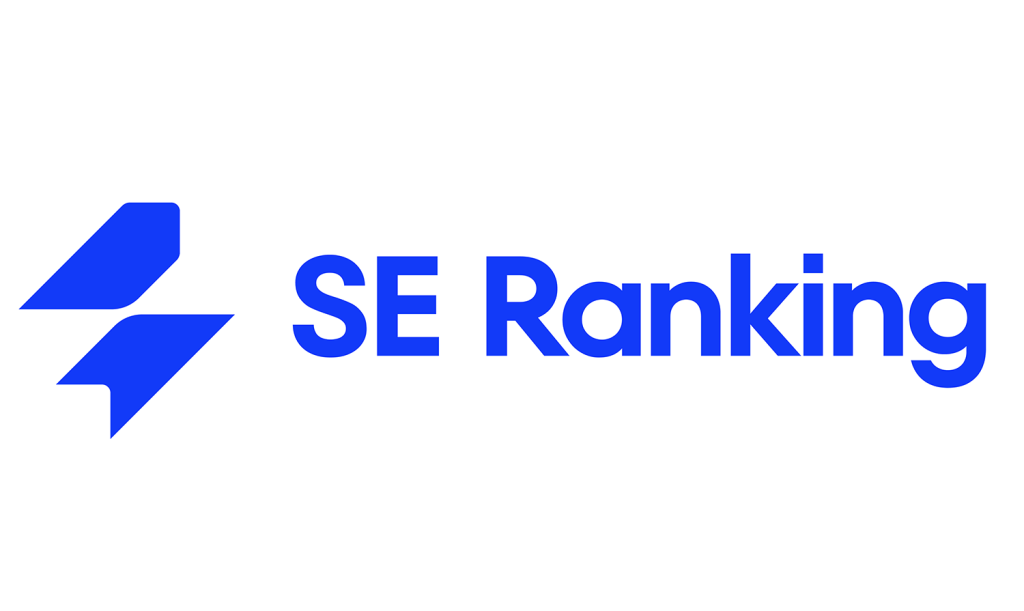
SE Ranking is positioned in the market as a well-rounded and highly affordable Ahrefs alternative. It is particularly attractive for users on a tighter budget who still require a comprehensive set of SEO functionalities. Its user interface presents data in a manner that is noted to be similar to Ahrefs, offering a degree of familiarity for those switching platforms.
Core Strengths
- Comprehensive Feature Set: The platform covers all essential SEO tasks, including keyword research, backlink analysis, site audits, and PPC research, and also includes tools for social media marketing.
- Affordability: SE Ranking’s primary advantage is its significantly lower price point compared to Ahrefs and Semrush, making it an excellent value proposition, especially for agencies managing multiple domains.
- Modern Features: Includes an AI Overviews Tracker to analyze AI-generated snippets for target keywords.
Identified Weaknesses
Smaller Data Indexes: Its keyword and backlink databases are smaller than those of market leaders like Ahrefs and Semrush.
- Fragmented User Interface: The UI can feel less intuitive and more fragmented for beginners, with features located in different menus, requiring a learning curve.
- Data Discrepancies: Victoria Kurichenko’s analysis revealed the platform’s organic traffic estimates were surprisingly low (3,300), significantly under-reporting the actual traffic shown in Google Search Console (8,000).
Pricing Model
- Plans start at $52 or $65 per month.
- A 14-day free trial is available.
Ideal User Profile: SE Ranking is ideal for SEO agencies, small businesses, and newer websites with tight budgets. It is a strong fit for users who are willing to invest some time in learning the interface to access a powerful, low-cost tool.
Moz Pro
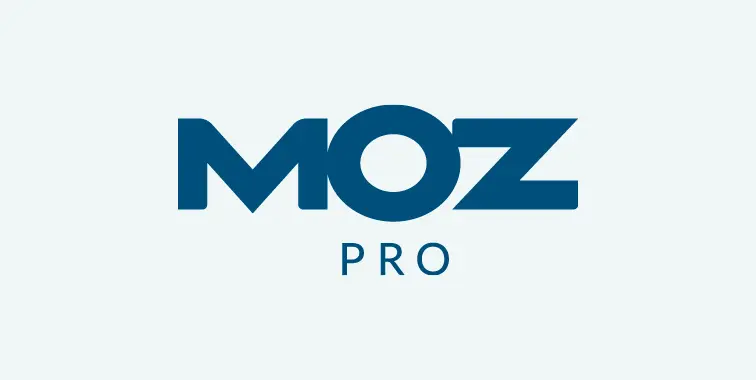
Moz Pro is one of the original solutions in the SEO software market. It maintains its position as a capable tool but is often perceived as having innovated at a slower pace than its primary competitors, Ahrefs and Semrush.
Core Strengths
- User-Friendly Experience: The platform features a user-friendly dashboard that is accessible to both beginners and professionals.
- Solid Keyword Tool: The Keyword Explorer tool is a notable strength, reporting on keyword search intent and providing organic Click-Through Rate (CTR) data.
- Large Backlink Index: Its backlink index is described as being “VERY close to Ahrefs” in size, making it a strong contender for link analysis.
- Generous Trials: Moz offers 10 free queries per month and a 30-day free trial for its paid plans.
Identified Weaknesses
- Limited Keyword Data: The Keyword Explorer is considered less informative than Ahrefs’, lacking metrics like global search volume and trends, and providing inconvenient search volume ranges.
- Missing Features: Moz Pro currently lacks traffic estimates and does not yet incorporate AI Overviews data into its reports.
- Perceived Value: Leigh McKenzie’s analysis concludes that Moz Pro provides less value at the $99/month price point compared to the more extensive feature sets of Ahrefs or Semrush.
Pricing
- Limited plans start at 39/49 per month.
- A more comparable plan with expanded tools starts at 79/99 per month.
Ideal User Profile: Moz Pro is best suited for users who require basic SEO, keyword, and backlink analysis and prioritize a straightforward, user-friendly interface over the most advanced features.
Other Notable All-in-One Alternatives
Beyond the primary competitors, the market includes several other all-in-one tools that cater to specific segments, such as users with extreme budget constraints or a preference for desktop-based software.
Key Differentiators & Target Audience
Ubersuggest
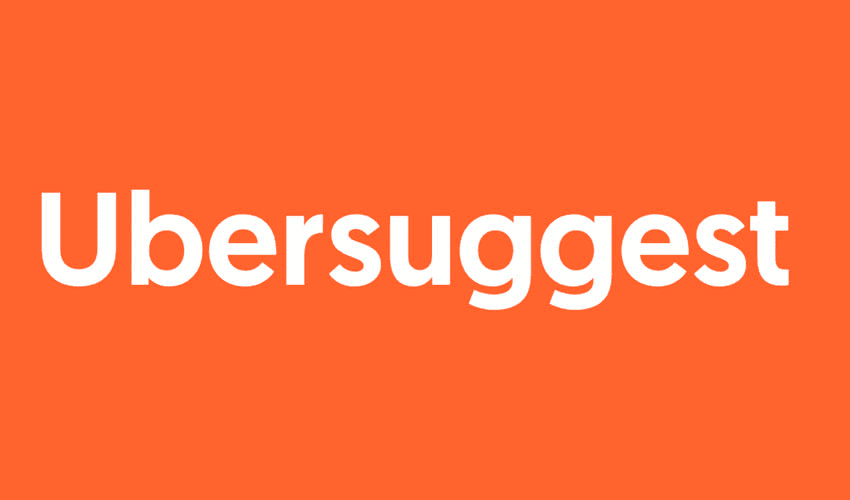
Positioned for hobbyists, beginners, and small businesses on a strict budget. Its main draws are a very low price point ($29/month) and an available lifetime deal for $290, making it a compelling option for those averse to recurring subscriptions. It features a beginner-friendly design but offers less detailed data, and its metrics can be inaccurate.
SEO PowerSuite
A unique offering as downloadable desktop software for Windows, Mac, and Linux, with no online version. It provides a generous free version and is less expensive than Ahrefs, but requires a mandatory annual subscription with no monthly payment option available.
Serpstat
An SEM solution for both SEO and PPC that includes AI content generation tools. A significant critique is that its keyword volume metric is based on Google Ads data, making it unsuitable for organic traffic analysis. Its organic keyword reports have also been found to be inaccurate.
The market for Ahrefs alternatives extends beyond these all-in-one suites into a vibrant ecosystem of specialized tools, which will be explored next.
Analysis of Specialized Tool Categories
For professionals who do not require a full suite replacement for Ahrefs, the market offers excellent specialized tools that provide deep functionality in a single domain. This section categorizes and evaluates leading alternatives based on their core function, offering targeted solutions for specific SEO tasks.
Backlink Analysis Tools
Ahrefs originally launched as a link-building tool and remains a leader in this area. Joining a Link Building Slack community can help marketers share strategies and stay updated on the latest link-building trends. However, several strong alternatives focus exclusively on backlink data, offering unique metrics and value propositions.
- Majestic: This tool is 100% focused on backlinks. Its key differentiators are its unique and widely respected Trust Flow and Citation Flow metrics, which help evaluate the quality and quantity of backlinks. While its data is solid, its user experience is considered outdated. It is best for users who only need in-depth link data.
- Monitor Backlinks: This is a specialized tracking tool that pulls its data from both Moz and Majestic. It is a niche product designed to monitor backlink profiles, acquire new links, and spy on competitors, without many other SEO features.
- Linkody: An affordable, niche backlink monitoring tool that also uses data from Moz and Majestic. Its primary value is providing 24/7 monitoring and email alerts when backlinks are removed or changed.
- OpenLinkProfiler: A completely free tool for conducting basic backlink checks on any website. It is suitable for bloggers and beginners who need a quick overview but lack the advanced features required for professional analysis.
Keyword Research & Content Ideation Tools
While Ahrefs’ Keyword Explorer is a core feature, several standalone tools offer unique and powerful approaches to keyword discovery and content strategy.
- SpyFu: Excels at competitor research for both SEO and PPC. Its primary strength is allowing users to see precisely which organic keywords competitors rank for and which paid keywords they bid on. It is cheaper than Ahrefs but lacks features like backlink audits.
- Keywords Everywhere: A convenient and inexpensive browser extension that provides keyword data (search volume, CPC, difficulty) directly within search engine results pages. It operates on a simple and affordable credit system.
- BuzzSumo: Positioned as a content marketing tool rather than a direct SEO platform. Its value lies in identifying content topics that have high social media engagement, which helps improve content quality and can indirectly boost SEO performance.
- Exploding Topics Pro: A unique tool focused on identifying and forecasting emerging trends before they become mainstream and competitive. This allows content creators and marketers to gain a first-mover advantage on new topics.
Rank Tracking Tools
While all-in-one suites include rank tracking, some specialized tools offer more granular, broader, or more affordable tracking capabilities.
- ProRankTracker: A dedicated rank tracking solution whose key advantage over Ahrefs is its ability to track keyword positions across multiple search engines (Google, Bing, YouTube, Amazon) and at a more granular location level (city or region). Its main drawback is that it requires manual entry of URLs and keywords.
- RankWatch: An affordable rank tracking platform well-suited for bloggers and small website owners. It offers concise and informative reporting. Noted cons include an outdated user interface and user claims of being slow to load.
These specialized tools provide powerful capabilities for targeted needs, leading to the final question of how to choose the right platform.
Choosing the Right Tool for Your Needs
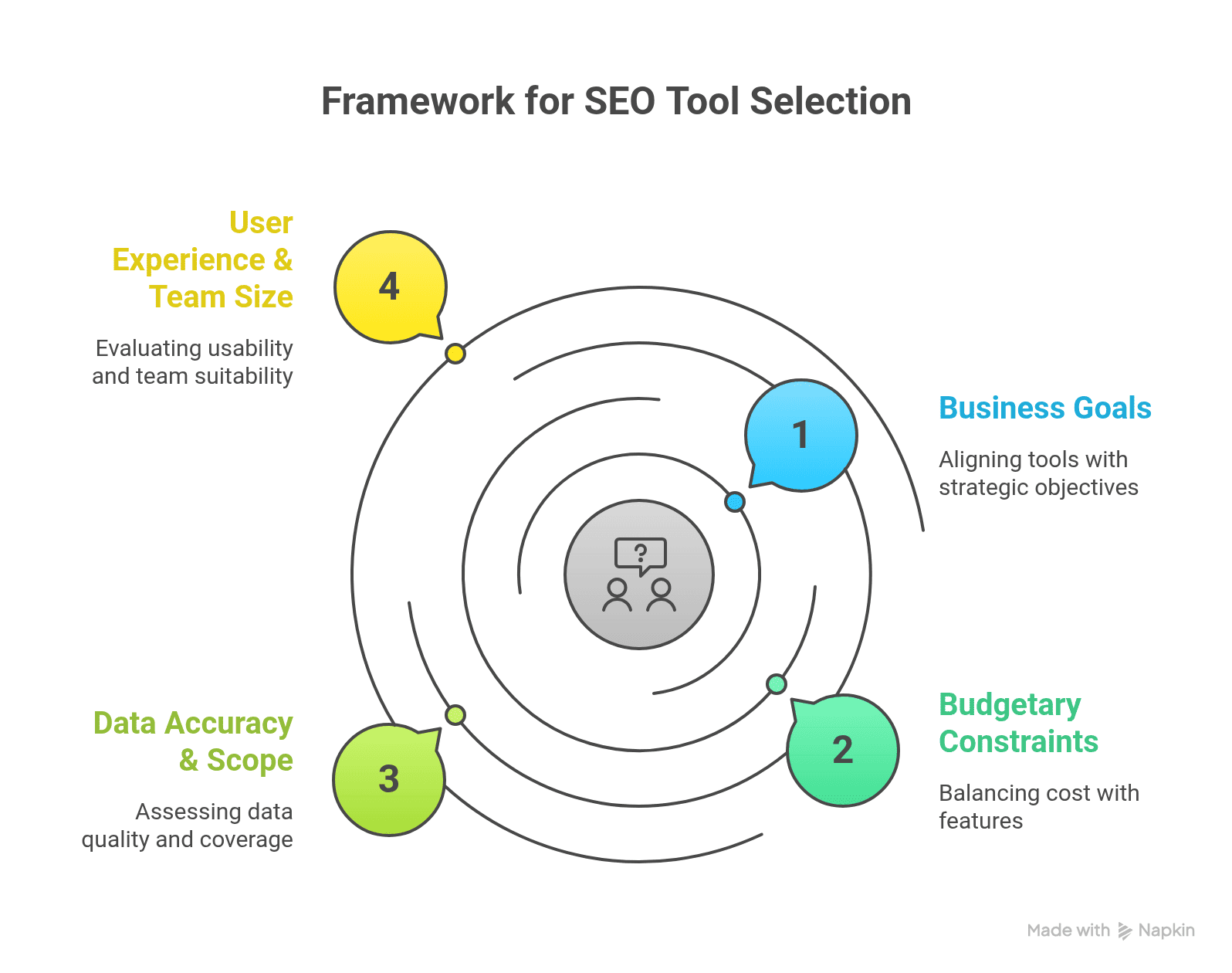
Selecting the correct SEO software is not about finding a single “best” tool, but about identifying the best fit for a specific business context. The ideal choice depends on a combination of strategic goals, budget, and operational needs.
This section synthesizes the key evaluation criteria from market analysis into a practical framework to guide the decision-making process.
Business Goals & Primary Use Case
The first step is to define the primary objective. If the goal is to manage a broad digital marketing strategy that includes SEO, PPC, and content marketing under one roof, a comprehensive all-in-one suite like Semrush is the logical choice.
Conversely, if the primary need is a single, highly specialized task—such as performing in-depth backlink analysis or identifying trending content topics—then a specialized tool like Majestic or BuzzSumo will deliver more focused value without the cost of unused features.
Budgetary Constraints
The Budget is a critical factor that segments the market significantly. While premium platforms like Ahrefs and Semrush offer extensive features, their pricing (starting over $100/month) can be prohibitive for smaller operations.
More affordable all-in-one options like SE Ranking offer a compelling balance of features and cost. For those on the tightest budgets, tools like Ubersuggest, with its low monthly price and lifetime deal, provide an entry-level solution, alongside various niche tools that serve specific functions at a lower cost.
Data Accuracy & Scope
The quality and scope of data are paramount. Semrush is noted for having a larger US keyword database and more accurate traffic estimates, while Ahrefs has a larger global keyword database but is sometimes cited for inflated traffic numbers.
This makes Semrush a potentially stronger choice for US-centric businesses, while Ahrefs may offer more visibility for international campaigns, a distinction highlighted in Victoria Kurichenko’s analysis.
It is important to recognize that smaller tools like Mangools and Ubersuggest operate with more limited databases, which may be sufficient for smaller websites but could be a limitation for enterprise-level analysis.
User Experience & Team Size
Finally, the platform’s usability and suitability for the team must be considered. Ahrefs is often praised for its excellent user experience, whereas Semrush, with its vast toolkit, can feel overwhelming to new users.
The choice between a cloud-based platform and downloadable desktop software like SEO PowerSuite depends on workflow preferences
For larger organizations, tools like Semrush are explicitly designed as a central hub for entire marketing teams, while others are better suited for solopreneurs or small businesses.
This framework provides a structured approach to evaluating the options and making an informed decision that aligns with strategic priorities.
Conclusion
This article demonstrates that the landscape of SEO software is more vibrant and competitive than ever. The central finding is that the ideal tool is not a universal constant but is dictated entirely by the specific needs, strategic goals, and budgetary realities of the user. The migration away from Ahrefs, driven by pricing change, has opened the door to a host of powerful and viable alternatives.
For users seeking a direct, powerful, and arguably more comprehensive alternative to Ahrefs, Semrush is consistently identified as the top choice. It excels not only in core SEO functionalities but also as an integrated digital marketing platform for broader team needs.
For users where budget is a primary consideration, SE Ranking and Ubersuggest emerge as strong contenders, offering robust feature sets at a fraction of the cost of premium suites. For professionals with highly specialized requirements, focused tools like Majestic for deep backlink analysis and BuzzSumo for content marketing ideation provide best-in-class capabilities. In a dynamic digital marketing environment, the most critical task for any professional is to align their tool selection with their strategic business objectives, ensuring that their software investment serves as a direct driver of growth and performance.



Leave A Comment